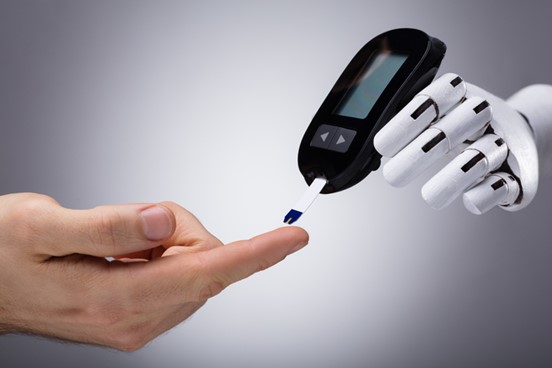Introduction
Diabetes management has been revolutionized by advancements in technology, with artificial intelligence (AI) at the forefront. AI is transforming how we approach diabetes care, making it more personalized, efficient, and effective. In this article, we will explore the significant role AI plays in diabetes management and how it benefits patients and healthcare providers alike.
AI-Powered Glucose Monitoring
One of the most impactful applications of AI in diabetes management is in glucose monitoring. Traditional methods of checking blood glucose levels involve frequent finger pricks, which can be cumbersome and uncomfortable. AI-driven continuous glucose monitors (CGMs) offer a less invasive alternative. These devices use sensors to continuously measure glucose levels in the interstitial fluid, providing real-time data to users. AI algorithms analyze this data to predict glucose trends and offer actionable insights, helping individuals manage their blood sugar levels more effectively.
Predictive Analytics for Better Management
AI’s predictive analytics capabilities are another game-changer in diabetes management. By analyzing historical glucose data, AI can predict future glucose levels and alert users to potential hypoglycemic or hyperglycemic events before they occur. This proactive approach enables timely interventions, reducing the risk of severe complications. For example, AI algorithms can suggest adjustments to insulin dosages or dietary changes based on predicted trends, offering a more tailored approach to diabetes management.
Enhanced Personalization of Treatment Plans
AI’s ability to analyze large volumes of data facilitates the creation of highly personalized treatment plans. By considering various factors such as genetic information, lifestyle habits, and medical history, AI can help healthcare providers develop customized treatment strategies for diabetes patients. This level of personalization ensures that treatments are more effective and suited to individual needs, improving overall health outcomes.
AI-Driven Apps for Diabetes Management
Several AI-powered apps are available that assist with diabetes management. These apps often include features such as glucose tracking, medication reminders, and dietary recommendations. AI algorithms within these apps can analyze user data and provide real-time feedback, helping individuals make informed decisions about their diabetes care. Additionally, some apps offer integration with wearable devices, enhancing their functionality and providing a comprehensive view of a user’s health.
Improving Diabetes Education
AI is also playing a crucial role in enhancing diabetes education. Educational platforms powered by AI can provide interactive learning experiences and personalized content based on the user’s knowledge level and learning style. This approach makes it easier for individuals to understand their condition, learn about effective management strategies, and stay motivated to adhere to their treatment plans.
AI in Research and Drug Development
AI is accelerating research and drug development in the field of diabetes. By analyzing vast datasets, AI can identify patterns and correlations that might be missed by traditional methods. This capability speeds up the discovery of new treatments and helps in the development of innovative therapies. AI is also used in clinical trials to optimize participant selection and monitor outcomes more efficiently.
Challenges and Future Directions
Despite its benefits, the integration of AI into diabetes management comes with challenges. Data privacy and security are major concerns, as sensitive health information is being collected and analyzed. Additionally, there is a need for regulatory frameworks to ensure the accuracy and reliability of AI-driven tools. As technology continues to evolve, ongoing research and development will be crucial in addressing these challenges and enhancing the effectiveness of AI in diabetes care.
Conclusion
Artificial intelligence is transforming diabetes management by offering innovative solutions that improve glucose monitoring, personalize treatment plans, and enhance patient education. As AI technology continues to advance, its role in diabetes care will likely expand, leading to even more effective and personalized approaches to managing this chronic condition. Embracing AI in diabetes management holds the promise of better health outcomes and a higher quality of life for individuals living with diabetes.

Artificial intellect algorithms match experts with job listings based on their credentials, knowledge, and availability. This guarantees that the right individual is put in the proper role, improving efficiency and pleasure for both groups.
leveraging AI-driven diagnostics and wearable health gadgets, Luminaire Health has allowed early detection